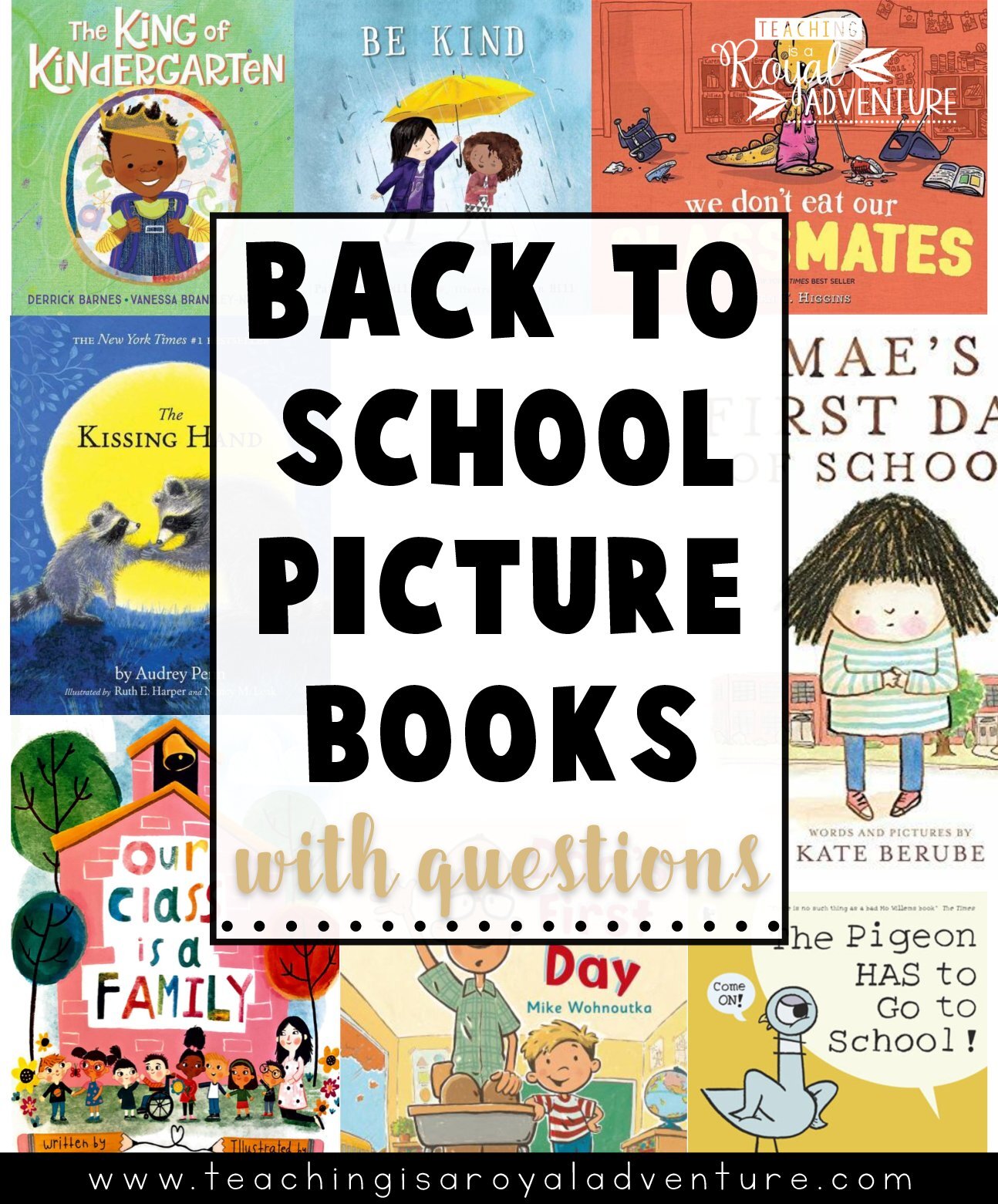Reading books with young children can help ease them into big life transitions. And, let’s be honest. Starting school or going back to school after summer break can be a big life transition with even bigger emotions. Here are eight of our current favorite books to read with young children at home or in the classroom. Each book provides parents, teachers, and other caregivers a low-stress way to talk about starting school, what to expect in school, and even how to act and make friends in a classroom. Use the provided questions to guide your conversations!
- The King of Kindergarten by Derrick Barnes (Link to: https://www.amazon.com/King-Kindergarten-Derrick-Barnes/dp/1524740748/)
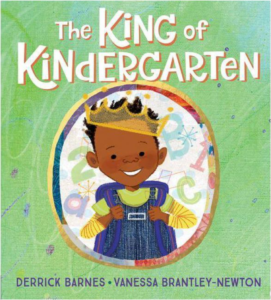
In this read aloud by Newbery Honor-winning author Derrick Barnes, young children will go on a royal adventure with a young boy experiencing his first day of kindergarten. (We love royal adventures around here!) As they read, children will gain confidence about how to approach the first day of school positively and get a glimpse of a typical school day routine.
Questions to ask while you read together:
- Before his first day, how do you think he feels about going to school? How can you tell?
- How do you feel about the first day of school?
- Why do you think his mom told him to greet everyone with a smile?
- How do you think Marie felt when he asked her to play during recess?
- What do you think will be your favorite part of school?
2. We Don’t Eat Our Classmates by Ryan T. Higgins (Link to: https://www.amazon.com/We-Dont-Eat-Our-Classmates/dp/1368003559/)
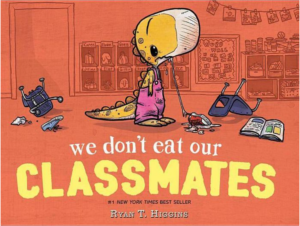
Poor Penelope. It’s her first time in school and Penelope the T. rex. struggles with making friends, because she wants to eat them. In this hilarious children’s book by author-illustrator, Ryan T. Higgins, young readers will be able to relate to the nervousness Penelope feels about making new friends at school and be encouraged by seeing how she overcomes her initial missteps.
Questions to ask while you read together:
- Are you feeling nervous about making new friends in school? Why or why not?
- What do you think would have happened if Penelope smiled and said hello to her new classmates instead of eating them?
- If this was your classroom, where would you pick to sit? Why would you sit there?
- What did Penelope do (and not do) to make friends?
- What can you do or how can you act in school to help make friends?
3. Be Kind by Pat Zietlow Miller (Link to: https://www.amazon.com/Be-Kind-Pat-Zietlow-Miller/dp/1626723214)
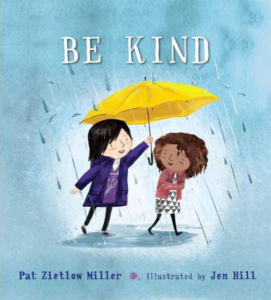
When a little girl spills juice all over her new dress, her classmate tries her best to be kind. Her first attempt didn’t go over so well so she thinks about what it means to be kind. Young children will gain an understanding of various ways to be kind, even when it is difficult. Giving young children specific ways to practice kindness can give them the confidence and practical tools to more easily make new friends in the classroom.
Questions to ask while you read together:
- How do you think Tanisha felt when she spilled grape juice on herself? How would you feel?
- What is one way someone was kind to you this week?
- How were you kind to someone else this week?
- Do you think treating people kindly makes you a good friend? Why or why not?
- How can you tell that Tanisha felt better when the main character gave her a painting?
4. The Kissing Hand by Audrey Penn (Link to: https://www.amazon.com/Kissing-Hand/dp/1933718005)
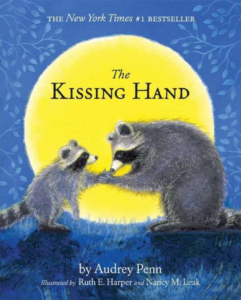
There’s a reason this book is such a classic. Young children and parents can both relate to the emotions of Mrs. Raccoon and Chester as they talk about going to school for the first time. Plus, the “secret” revealed about the Kissing Hand can become a back-to-school tradition for a new generation of families!
Questions to ask while you read together:
- Why didn’t Chester want to go to school?
- What were some of the things that Mrs. Raccoon told Chester he would love about school?
- Which one do you think you will love the most? Why?
- What does Mrs. Raccoon tell Chester he can do whenever he feels lonely and needs his mom?
- At school, what can you do when you start to miss your family at home?
5. Our Class Is a Family by Shannon Olsen (Link to: https://www.amazon.com/Our-Class-Family-Shannon-Olsen/dp/0578629097)
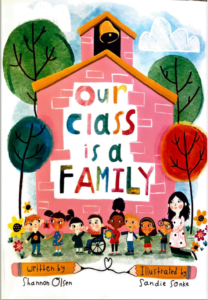
Although recently published, we predict this book will join the rank of “classic,” especially for early childhood educators to use during the first couple of weeks of school. In this book, young learners will be introduced to different people who might be in a family and make the connection that the people in their classroom can be a family, too.
Questions to ask while you read together:
- Who are some people who love you? (Your parents? Your brother or sister? Your step-dad? Your best friend? Your dog?)
- How can you show kindness to a friend in your class?
- How can your teacher help you when you are having a bad day?
- What is one thing you have in common with a classmate?
- What are some ways your class is like a family?
6. Mae’s First Day of School by Kate Berube (Link to: https://www.amazon.com/Maes-First-School-Kate-Berube/dp/1419723251)
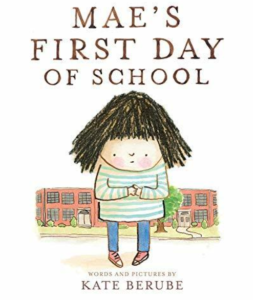
It’s Mae’s first day of school and she does not want to go. Young children will love the twist on a familiar theme as Mae refuses to go into the school by hiding in a tree out front. However, she doesn’t hide up there alone. Soon another little girl joins her and is quickly followed by a teacher.They don’t want to go to school either. Children transitioning to school will discover that everyone—even teachers—feel nervous on the first day.
Tip: If you also read The King of Kindergarten, ask how Mae and the boy who pretended to be a king handled their first day differently. Talking about the different mindsets can help young children learn that they can choose how they respond about going to school.
Questions to ask while you read together:
- Why doesn’t Mae want to go to school?
- Why doesn’t Rosie want to go to school?
- Why doesn’t Mrs. Pearl want to go to school?
- What do Mae, Rosie, and Pearl have in common? What do you have in common with them?
- Why did Mae, Rosie, and Pearl decide to go to school that day afterall?
7. The Pigeon Has to Go to School! by Mo Willems (Link to: https://www.amazon.com/Pigeon-HAS-Go-School/dp/1368046452/)
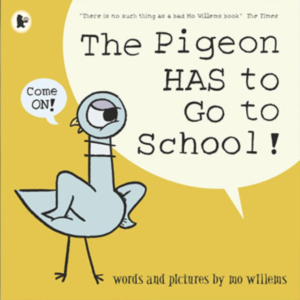
You can not go wrong with a Pigeon book by Mo Willems. In this one, the pigeon gets all worked up about going to school for the first time. Young children will be able to relate to the pigeon’s fears and concerns while also finding the laugh-out-loud humor a soothing tool to help them process those emotions.
Questions to ask while you read together:
- What question would you ask the pigeon?
- What are some of the things that scare the pigeon about school?
- What are some of the things that scare you about school?
- What helped change the pigeon’s mind about going to school?
- What do you think the pigeon was most excited about school? How can you tell?
8. Dad’s First Day of School by Mike Wohnoutka (Link to: https://www.amazon.com/Dads-First-Day-Mike-Wohnoutka/dp/1619634732)
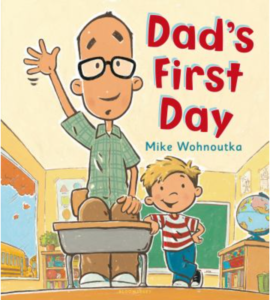
Oliver and his dad enjoyed their summer together but now it’s time for school and one of them is not quite ready for the transition. With tongue-in-cheek humor, it’s the dad—not Oliver—who feels nervous and just wants them to stay home together. Young readers will appreciate the twist and it gives parents and teachers an easy entry to talk about the feelings we all experience on the first day of school.
Questions to ask while you read together:
- What were some of the things that Oliver and his dad did together over the summer?
- What is one of your favorite summertime activities?
- In order to get ready, what did Oliver and his dad do the night before school?
- Why do you think Oliver’s dad wasn’t ready for him to go to school?
- What changed his mind?
It’s Your Turn. What Are Your Favorite Back-to-School Books to Read?
We know we left off some of your go-to books to read when school starts. Let us know in the comments so we can add to our growing libraries.
